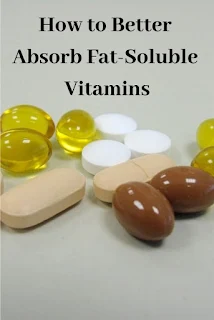Most of us take vitamins or multivitamins. It might not seem important to know the different between fat-soluble and water-soluble vitamins. Knowing the differences will help you get the most out of your vitamins and keep you from waste money.
Water-Soluble Vitamins
All you need to remember is that Vitamin C and all B vitamins are water-soluble and the others are fat-soluble. Since there are different names for each B vitamin, here is a list of the water-soluble vitamins.
- Vitamin C
- Vitamin B complex
- B1 (thiamin)
- B2 (riboflavin)
- B3 (niacin)
- B5 (Pantothenic acid)
- B6 (pyridoxine)
- B7 (biotin)
- B12 (Cobalamin)
- B9 - Folate or folic acid. Folic acid is man-made vitamin B9 and folate is natural and comes from plants.
Fat-Soluble Vitamins
Fat-soluble vitamins are broken down differently than water-soluble vitamins. The fat-soluble vitamins are:
- Vitamin A
- Vitamin D
- Vitamin E
- Vitamin K
How Fat-Soluble and Water-Soluble Vitamins Are Absorbed
All of the nutrients we eat and drink, including vitamins and supplements, are absorbed through the small intestine. But before reaching the small intestine, these nutrients pass through the upper digestive system. The upper digestive system includes the mouth, esophagus, and stomach.
Water-soluble vitamins dissolve in water, usually water in the lower digestive system along with electrolytes or various salts (potassium, sodium, bicarbonate, and chloride).
Fat-Soluble vitamins are different and are broken down by bile acids secreted by the liver. Bile is very important for the digestion and absorption of fats in the small intestine. Bile is made in the liver and stored in the gallbladder. When fat enters the small intestine, the liver secretes the bile to break down the fat.
Fat-soluble vitamins also need this bile to break down. So it is important that you eat some fat when you take a multivitamin or one of the fat-soluble vitamins.
If you are in a hurry when you take a multivitamin or fat-soluble vitamin, eating a little bit of peanut butter, a few nuts or some Greek yogurt (not fat-free) will work fine.
When To Take Vitamins
Taking vitamins with a meal is the best time. You should not take vitamins with coffee or any drink that has caffeine. Wait a couple of hours after drinking coffee or a caffeinated drink before taking vitamins.
Health Conditions and Vitamins
Certain health conditions can stop the body from absorbing vitamins properly. These health conditions are usually in the digestive tract and include Celiac disease, Crohn’s disease and inflammatory bowel disease (IBS).
Other health issues with the liver or pancreas can also inhibit or prevent the absorption of fat-soluble vitamins. A liquid vitamin or liquid multivitamin can help a person absorb vitamins better if they have any of these health issues.
Note: Always check with your doctor before taking any supplements. Supplements taken with medications can be dangerous.
About the Author
Sam Montana is a certified Food Over Medicine instructor from the Wellness Forum Health Center and certified in optimal nutrition from the Harvard T.H. Chan School of Public Health.
Copyright © 2012-2019 Sam Montana

